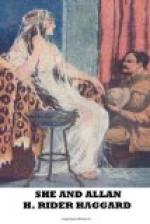Still, the whole incident left a disagreeable impression on my mind, and I began to wish that we were safe across the Zambesi without more trouble. But we could not start at once because two of the Zulus were still not well enough to travel and there were many preparations to be made about the loads, and so forth, since the waggon must be left behind. Also, and this was another complication—Hans had a sore upon his foot, resulting from the prick of a poisonous thorn, and it was desirable that this should be quite healed before we marched.
So it came about that I was really glad when Captain Robertson suggested that we should go down to a certain swamp formed, I gathered, by some small tributary of the Zambesi to take part in a kind of hippopotamus battue. It seemed that at this season of the year these great animals always frequented the place in numbers, also that by barring a neck of deep water through which they gained it, they, or a proportion of them, could be cut off and killed.
This had been done once or twice in the past, though not of late, perhaps because Captain Robertson had lacked the energy to organise such a hunt. Now he wished to do so again, taking advantage of my presence, both because of the value of the hides of the sea-cows which were cut up to be sent to the coast and sold as sjamboks or whips, and because of the sport of the thing. Also I think he desired to show me that he was not altogether sunk in sloth and drink.
I fell in with the idea readily enough, since in all my hunting life I had never seen anything of the sort, especially as I was told that the expedition would not take more than a week and I reckoned that the sick men and Hans would not be fit to travel sooner. So great preparations were made. The riverside natives, whose share of the spoil was to be the carcases of the slain sea-cows, were summoned by hundreds and sent off to their appointed stations to beat the swamps at a signal given by the firing of a great pile of reeds. Also many other things were done upon which I need not enter.
Then came the time for us to depart to the appointed spot over twenty miles away, most of which distance it seemed we could trek in the waggon. Captain Robertson, who for the time had cut off his gin, was as active about the affair as though he were once more in command of a mail-steamer. Nothing escaped his attention; indeed, in the care which he gave to details he reminded me of the captain of a great ship that is leaving port, and from it I learned how able a man he must once have been.
“Does your daughter accompany us?” I asked on the night before we started.
“Oh! no,” he answered, “she would only be in the way. She will be quite safe here, especially as Thomaso, who is no hunter, remains in charge of the place with some of the older natives to look after the women and children.”
Later I saw Inez herself, who said that she would have liked to come, although she hated to see great beasts killed, but that her father was against it because he thought she might catch fever. So she supposed that she had better remain where she was.




